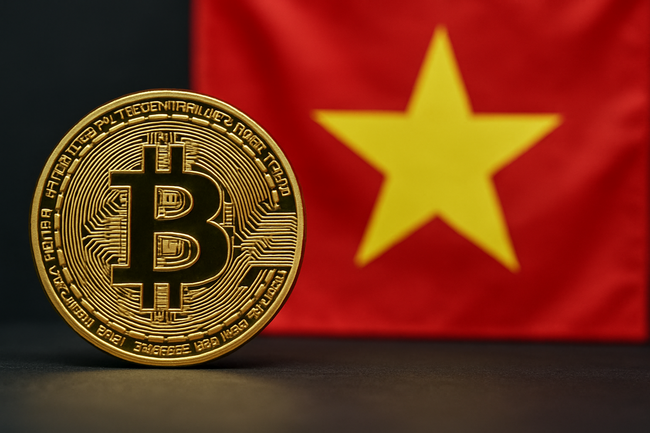Highlights:
- Vietnam has launched a five-year pilot to bring domestic crypto trading under official oversight.
- NDAChain allows secure transactions and tokenization of bonds, invoices, and carbon credits.
- The new licensing and biometric rules aim to strengthen compliance and protect investors.
Vietnam has officially launched a five-year pilot program to regulate its domestic crypto market. The initiative aims to bring the country’s $100 billion informal crypto trading sector under official oversight. Local authorities designed the program to redirect trading from offshore platforms into licensed domestic channels. The program follows the Law on Digital Technology Industry passed in June 2025, which recognizes digital assets and requires all crypto platforms to obtain domestic licenses.
😧 JUST IN: Vietnam embraces Cryptocurrency with launch of regulated market.
Telegram | Twitter #Crypto #Web3 #DeFi #Finance #CryptoNews
— GSMART_MONEY (@GSMART_money) September 23, 2025
Licensed exchanges are required to provide direct transactions in Vietnamese dong starting in 2026. Authorities stress that the pilot will secure investors, introduce crypto to the national economy, and receive tax revenues. Analysts observe that exchanges that are first licensed may have large trading volumes and market information that is currently flowing outside the country.
The pilot also enforces anti-money laundering (AML) and counter-terrorist financing (CFT) rules. Platforms must meet minimum capital requirements of VND 10,000 billion, roughly $400 million. The government limited foreign ownership to 49% in order to have domestic control. The program establishes high reporting requirements for exchanges and service providers, and it is a good indicator of a new regulatory compliance era in Vietnam.
Vietnam Launches Five-Year Pilot to Regulate Digital Assets
The core of the project is the national blockchain platform in Vietnam, NDAChain. NDAChain will facilitate safe transactions and the tokenization of traditional assets such as bonds, invoices, and carbon credits. This system can be used to automate payments, transfers of ownership, and commercial settlements through licensed platforms. The government is also looking into controlled stablecoins to enable 24/7 low-cost transfers in Vietnamese dong.
The blockchain allows verifying identities and shared storage of data, and is compliant with the AML and CFT requirements. Insurance companies, pension funds, and business organizations can join, tying the digital assets to the wider financial system of Vietnam. The businesses can make payments, deposits, and invoice settlements through NDAChain and develop a regulated digital market.
Government officials believe that NDAChain will provide new sources of fundraising and provide regulators with more opportunities. Licensed exchanges are likely to receive trading volume that was previously enjoyed by offshore platforms. The platform provides a foundation for future digital asset integration across multiple sectors, including banking, investment, and commercial finance. Early adoption by exchanges could increase revenue streams and strengthen domestic economic activity.
Adoption Challenges and Market Compliance
Vietnam has one of the highest crypto adoption rates in the world. According to recent surveys, the number of citizens who actively trade digital assets is about 21 million, and annual volumes are more than 100 billion. The sector has experienced years of regulatory challenges despite the high adoption. The State Bank of Vietnam was the first to issue warnings on Bitcoin in 2014, claiming volatility and money laundering.
Recently, the government has implemented biometric checking of bank accounts. More than 86 million accounts were terminated due to non-compliance, and 113 million accounts were verified. Foreign residents might have encountered hurdles, such as travel conditions, in updating account information. A Reddit user highlighted the difficulty, saying authorities required an in-person visit to prevent account closure.
🚨 Vietnam is set to close ~86M bank accounts due to new biometric verification rules (face scans, fingerprints, etc).
What this shows 👇
– Centralized banking = access can be revoked anytime.
– Miss verification → lose your funds.
– Rural citizens & those without tech/ID… pic.twitter.com/3vyrSlLzhY
— Isah Aliyu Mohammed (@aaleey_designs) September 23, 2025
Officials consider these steps necessary to minimize fraud and promote the regulated crypto economy. The pilot program provides clarity to the market players and guarantees investor protection and national control.
Best Crypto Exchange
- Over 90 top cryptos to trade
- Regulated by top-tier entities
- User-friendly trading app
- 30+ million users
eToro is a multi-asset investment platform. The value of your investments may go up or down. Your capital is at risk. Don’t invest unless you’re prepared to lose all the money you invest. This is a high-risk investment, and you should not expect to be protected if something goes wrong.






